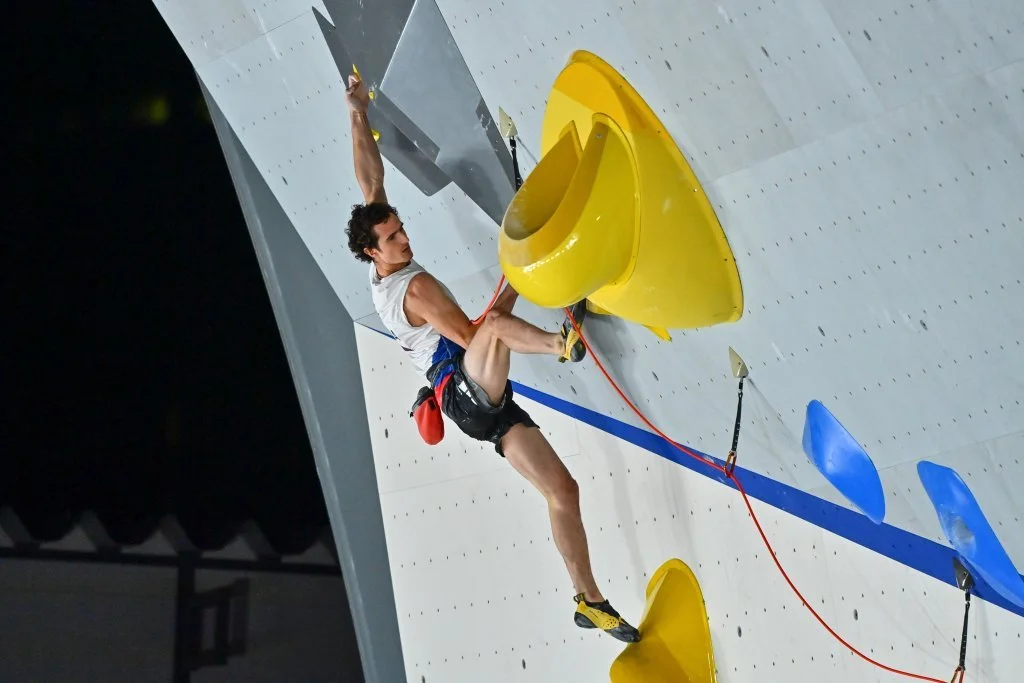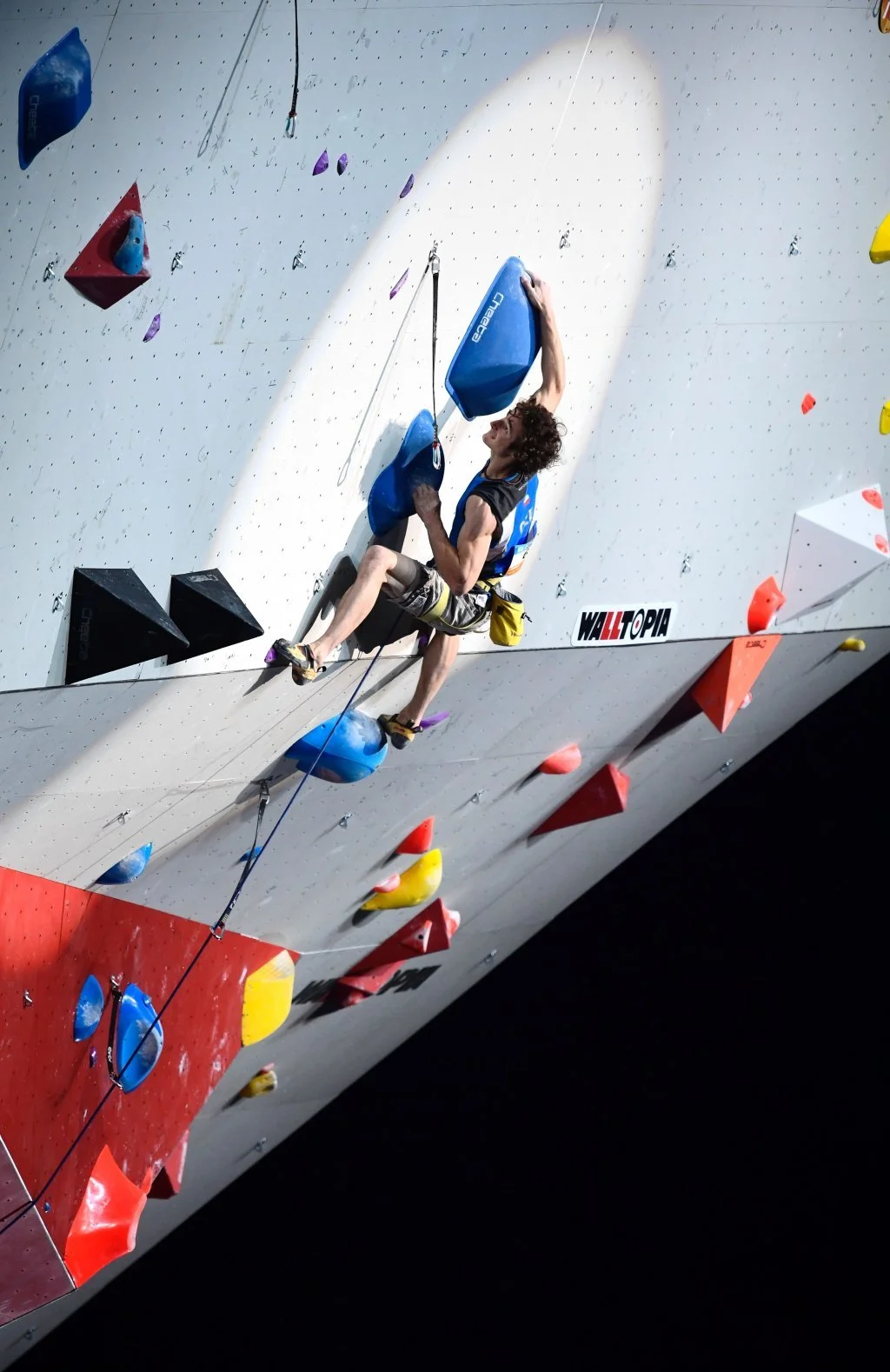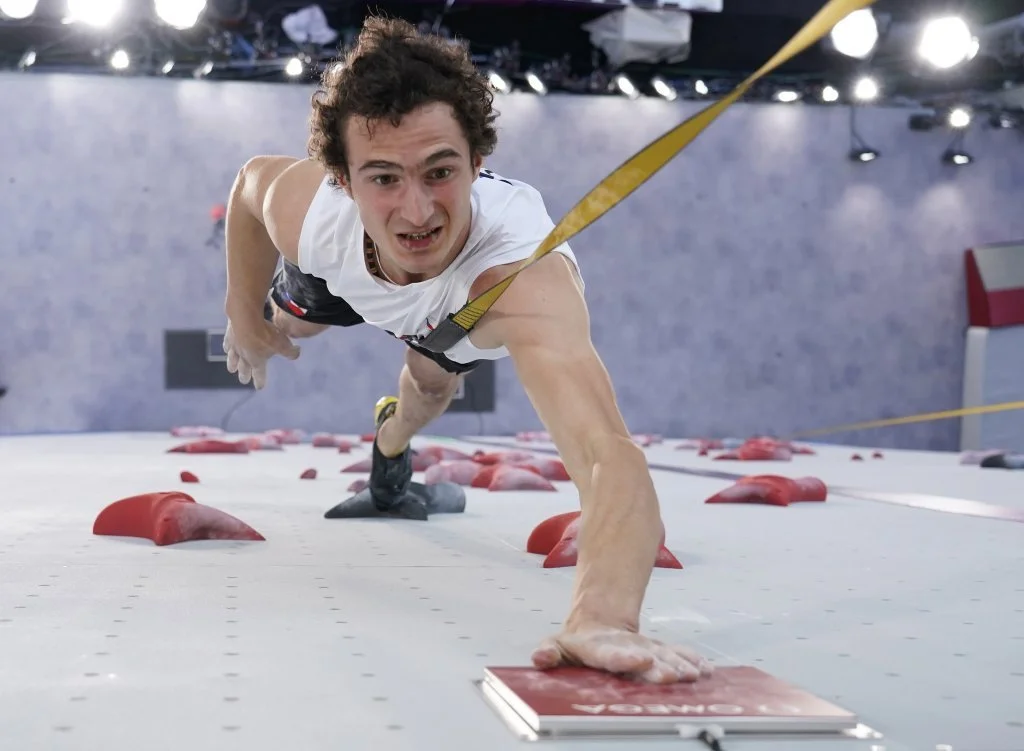Adam Ondra on Rock Climbing, Lead and Goals
Adam Ondra is the international face of climbers everywhere. The Czech has millions of views on YouTube, showcasing his skill in rock climbing online. The climbing super star is seen as the male GOAT of the sport. But doesn’t only climb outdoors. To get a taste of the best of both worlds the professional athlete also competes indoors, with uncanny success. We talked to Ondra in an exclusive interview about the differences in the climbing world and his ultimate competition of 2022.
© Anthony Dibon / Kontributor/ Getty Images
“I still believe, even though some of the coaches would maybe disagree, that there is a synergy,” Ondra says right from the jump. In his eyes rock climbing teaches you many things you can “take advantage of while you’re out there competing.”
“In rock climbing there is no schedule, there are no competitions. The only goal is to climb the route you want to climb.” Though some situations can nevertheless create the exact same competition pressure. Think “you are in a certain place for two weeks and this is your last day. […] And if you don’t do it, you might never return. And that’s a very similar kind of stress that you feel at a competition.”
© MIGUEL MEDINA / Staff/ Getty Images
Technical Differences Outdoor and Indoor
But, as some of those coaches would chip in, there are more than enough differences. “Usually, the holds on the artificial wall have less friction. So, it’s easier to slip.” Therefore, softer hands are more sought after on the bigger, less frictional holds in sport climbing, while dry and rough skin is favoured in rock climbing.
The mental aspect is different as well. Mother nature creates the outdoor holds, which you follow intuitively. Whereas walls indoors are set by mankind, “and you are kind of trying to get into the mind of the route-setter.” It is helpful to try route-setting yourself, “because you know all the nuances” if you practice being on the other side.
Nevertheless, not knowing what will await you at a competition “makes it all the more interesting” to Ondra. The Czech prepares “for all kinds of styles, for all kinds of hand-holds, foot-holds, dinos and angles.” Since climbers can expect the routes to be complex none of his training will be in vain either, remarks the athlete. Only the sequence remains a mystery. What’s important is “how you can see what the route-setter had in mind and how you can execute it first try.”
The 29-year-old has gained sufficient experience throughout his career to know what the ask is straight away: “I see a route, and mostly I can get the hang of how it should be climbed and then I just execute it without much thinking.” That doesn’t mean the sport is easy, however, on the contrary! It’s an incredible show of multitasking, “because you have to think about so many different things. Where to place your hand, where to place your feet, whether this hold is good enough for a few seconds rest, where you should actually clip the rope into the carabiner, when you should stop and put your hand in the chalk bag, so that your hand doesn’t get sweaty and slippery higher up.” But in his experience, there is no way to decide on all of those details properly and actively at once, which is where intuition and flow come into play. “Everything has to be decided subconsciously.”
Differences in Sport Climbing Disciplines
Speed climbing is the ultimate example of this, it’s literally about muscle memory. “Those speed specialists know exactly, perfectly what to do, in every millisecond of their climbing.” World record holder Aleksandra Mirosław can attest to the militant focus on one beta, and told us all about it in an exclusive interview.
As the route is unknown in boulder and lead there can’t be such a thing as muscle memory outside of the speed event.
Speed climbing focuses on explosiveness, power and raw strength. “Whereas in bouldering and lead climbing it’s maybe less about the physical part. And in lead climbing you obviously need some endurance muscle fibres as well, because you really have to sustain very intense climbing about three to five or six minutes.”
© Tsuyoshi Ueda - Pool / Auswahl/ Getty Images
The movements themselves are fundamentally divergent too, which Ondra had to learn the hard way. The 2020 Olympics only offered one competition, which was a combined format of all three disciplines. And many struggled hard having to suddenly hone their skills in other areas. “Speed climbing is not climbing, it’s running. And you really have to run up the wall. At the beginning I was climbing really fast, considering I was climbing, but it wasn’t running.” Therefore, the training regimen differs as well, with speed climbers heading to the gym more often than their counterparts.
One Chance at Glory
All athletes are only given one try in lead, which makes them face a considerable risk, which must be evaluated thoroughly. “On my level it can be considered a huge mistake if I hesitate for only one second in one section. But if I try to avoid all these hesitations maybe I’m risking quite a lot.” One has to balance taking risks and avoiding miscalculations in a rush. Ondra knows exactly what type of athlete he is and where he falls on the spectrum. “I am aware that I'm a competitor who, from the point of view of other competitors, risks a lot. While at the same time I know that this is my style.”
Glorious, Star-Studded Pioneer
And he is well-loved for his flair, though he – unlike many in the community – doesn't see himself as the GOAT. It is generally hard to decipher if you have climbed your best, he explains. This opens up the rare opportunity for ceaseless motivation, even after multiple international titles and accolades. “Once I’m finished with the hardest route of my life on the rock, there is always another one that could be even harder.” The key to this mindset is to always want to improve yourself first, before setting up comparisons.
And Ondra’s life quite literally revolves around improving as a climber. He has an extensive bucket list of routes up his sleeve. “I think I have too many routes on my mind. The sad thing is I know I will never, ever be able to climb all of them. But, well, at the same time it’s cool that I will never, ever be bored.” Even at home he won’t get bored, because of his mesmerising home climbing wall. Since its instalment he can have multiple short practices a day, eliminating travel time or the alternative of fewer, yet longer workout sessions.
But climbing isn’t just a sport to Ondra, “it’s so much more”, it’s his whole lifestyle. A proper climbing day to him means being on the rock at the crack of dawn. It’s not all about solitude in nature, however. “When I’m out there on the rock I definitely prefer climbing alone or with my few friends, but competition climbing is a sport. It should be brought to as many people as possible. And actually, if you say that it’s going to be on the square in the city centre, I think those are the competitions that have the best locations for our sport.”
© Marco Kost / Kontributor/ Getty Images
Climbing in Munich’s Heart
The European championships in sport climbing and beach volleyball will both take place at Königsplatz, a fundamentally important square to the Bavarian capital. And the city knows how to stage a memorable competition, reiterates Ondra. “In Munich itself there already is a tradition of making World Cups on Olympic stadium, and it was by far my favourite round of the World Cup circuit. Also, Munich is a climbing city, it is full of climbers,” which in turn creates great vibes for the athletes as they have an interested and knowledgeable crowd.
Ondra’s focus will be on his specialty: lead (and being in the lead), though he is looking to go all-out. “I think most probably I will do boulder, lead, and boulder & lead combined.” Until August the Czech sees a good opportunity to experiment with his training.
The multisport event isn’t only going to feature sport climbing and beach volleyball in the city centre, but nine European championships, which Ondra is excited for. “Out of the other sports I’m the closest to being an athletics fan. I’ve actually never watched a real professional athletics competition. […] I would be very interested in seeing and maybe cheering for some of the Czech athletes.”
And if he can’t make it to the historic Olympiastadion from 1972 to watch athletics, Ondra can simply turn around and head to the other side of the just as monumental Königsplatz to watch beach volleyball after the finals of boulder & lead. He surely won’t be disappointed to see the athleticism of the likes of Anders Mol and Christian Sørum or Katja Stam and Raïsa Schoon.




